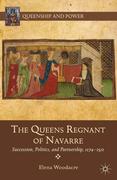14 Results for : regnant
-

Queen Elizabeth II: The Life and Legacy of Britain's Second Longest Reigning Monarch , Hörbuch, Digital, ungekürzt, 80min
When I was 21 I pledged my life to the service of our people, and I asked for God's help to make good that vow. Although that vow was made in my salad days, when I was green in judgement, I do not regret nor retract one word of it. (Elizabeth II) Until the implementation of new legislation on March 26, 2015, men were given preference to women in the British royal line. This system of male primogeniture meant that women seldom inherited the throne, and even when they did, they were often dominated by male councilors. Those women who married British kings gained the title of queen, but they were queen consorts, holding the title with no power. This makes Elizabeth II one of a select few queens regnant - queens ruling in their own right - and one of even fewer to set her own course in the history of her family and its throne. Nonetheless, Queen Elizabeth II has become so much a part of British society and culture that her presence is taken almost for granted, setting the standard people now expect of a British monarch. The longest lived and second longest reigning monarch in British history, Elizabeth II has overseen her country during a time of incredible turmoil and ever-accelerating change, providing a stable figure at the heart of a nation going through seemingly endless upheavals. ungekürzt. Language: English. Narrator: Lavina Jadhwani. Audio sample: https://samples.audible.de/bk/acx0/037686/bk_acx0_037686_sample.mp3. Digital audiobook in aax.- Shop: Audible
- Price: 9.95 EUR excl. shipping
-

The Influence of Monarchs: Steps in a New Science of History , Hörbuch, Digital, ungekürzt, 783min
Monarchs, as such, bear a variety of titles - king or queen, prince or princess (e.g., sovereign prince of Monaco), emperor or empress (e.g., emperor of China, emperor of Ethiopia, emperor of Japan, emperor of India), archduke, duke, or grand duke (e.g., grand duke of Luxembourg), emir (e.g., emir of Qatar), sultan (e.g., sultan of Oman), or a pharaoh.Monarchy is political or sociocultural in nature, and is generally (but not always) associated with hereditary rule. Most monarchs, both historically and in the present day, have been born and brought up within a royal family (whose rule over a period of time is referred to as a dynasty) and trained for future duties. Different systems of succession have been used, such as proximity of blood (male preference or absolute), primogeniture, agnatic seniority, Salic law, etc. While traditionally most monarchs have been male, female monarchs have also ruled, and the term queen regnant refers to a ruling monarch, as distinct from a queen consort, the wife of a reigning king.Some monarchies are nonhereditary. In an elective monarchy, the monarch is elected, but otherwise serves as any other monarch. Historical examples of elective monarchy include the Holy Roman emperors (chosen by prince-electors, but often coming from the same dynasty) and the free election of kings of the Polish-Lithuanian Commonwealth. Modern examples include the Yang di-Pertuan Agong of Malaysia, who is appointed by the Conference of Rulers every five years or after the king's death, and the pope of the Roman Catholic Church, who serves as sovereign of the Vatican City State and is elected to a life term by the College of Cardinals. ungekürzt. Language: English. Narrator: Tim Johns. Audio sample: https://samples.audible.de/bk/acx0/232549/bk_acx0_232549_sample.mp3. Digital audiobook in aax.- Shop: Audible
- Price: 9.95 EUR excl. shipping
-

The Queens Regnant of Navarre
The Queens Regnant of Navarre - Succession Politics and Partnership 1274-1512: ab 96.49 €- Shop: ebook.de
- Price: 96.49 EUR excl. shipping
-
